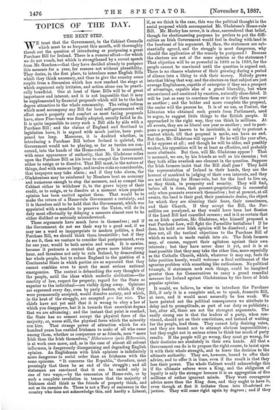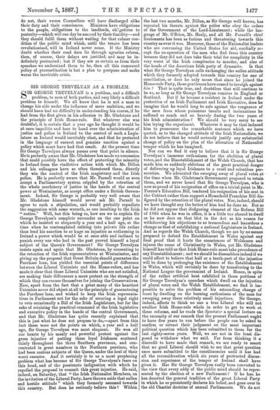TOPICS OF THE DAY.
THE NEXT STEP.
-NATE trust that the Government, in the Cabinet Councils which must be eo frequent this month, will thoroughly thresh out the question of introducing or postponing a great Purchase Bill for Ireland. There is a rumour afloat—for which we do not vouch, but which is strengthened by a recent speech from Mr. Goschen—that they have decided already to postpone this measure for a year, for reasons not without plausibility. They desire, in the first place, to introduce some English Bills which they think necessary, and thus to give the country some respite from a discussion which has now reached the stage at which argument only irritates, and action alone can be practi- cally beneficial. One at least of these Bills will be of great importance and interest, and it is not impossible that it may be supplemented by financial proposals which will be to the last degree attractive to the whole community. The rating reform which must accompany any Bill for local self-government will affect men's property and comfort as most taxing proposals have, since Free-trade was finally adopted, usually failed to do. It is quite impossible to carry such a Bill aide by side with a Purchase Bill ; and the claims of England and Scotland to legislation have, it is argued with much justice, been post-
poned too long. Moreover, it is doubted whether, in introducing a Purchase Bill before Ireland is quieted, the Government would not be playing, as far as tactics are con- cerned, into the bands of the Home-rulers. It is announced, with some appearance of authority, that Mr. Gladstone relies upon the Purchase Bill as his lever to compel the Government either to resign or to dissolve. That Bill must,in the nature of things, deal with sums so large, and involve risks so considerable, that taxpayers may take alarm ; and if they take alarm, the Gladitonians may be reinforced by Members bent on economy and numerous enough to stop the measure, and eo compel the Cabinet either to withdraw it, to the grave injury of their credit, or to resign, or to dissolve at a moment when popular opinion has been excited against them. That would be to make the return of a Home-rule Government a certainty, and it is therefore said to be held that the Government, which was appointed with a mandate to preserve the Union, will do its duty moat effectually by delaying a measure almost sure to be either disliked or seriously misunderstood.
These arguments have much force in themselves ; and if the Government do not see their way to a good and, if we may use a word so inappropriate to modern politics, a final Purchase Bill, we should think them irresistible ; but if they do see it, then we venture to consider that postponement, even for one year, would be both unwise and weak. It is unwise, because it protracts a contest that grows more bitter every hoar, and threatens not only to ruin Ireland, by demoralising her whole people, but to reduce England to the position of a Continental State in which parties are so separated that they cannot combine even to meet the most serious national emergencies. The contest is debauching the very thoughts of the people, until the ideas which underlie civilisation—the sanctity of law, respect for property, regard for the State as superior to the individual—are visibly dying away. Opinions are expressed every day, even by party leaders, which, if they were permanently accepted, would dissolve society, and which, in the heat of the struggle, are accepted pro hoc vice. The chiefs have not yet said that it is wrong to obey a law of which you disapprove, but it is towards that anarchist dogma that we are advancing ; and the instant that point is reached, the State has no cement except the physical force of the majority, or, worse still, the physical force which the minority can hire. That strange power of attraction which for six hundred years has enabled Irishmen to make of all who came among them, whether as conquerors or as friends, men "more Irish than the Irish themselves," Iliberniores ipsis ilibernicis, is at work once more, and, as in the case of almost all solvent influences, is dangerously disorganising and degrading English opinion. An Englishman with Irish opinions is indefinitely more dangerous to social order than an Irishman with the same opinions. " It concerns the Republic," therefore, most pressingly that there be an end of the struggle ; and all statesmen are convinced that it can be ended only in one of two ways,—by the concession of Home-rule, or by such a complete revolution in tenure that the majority of Irishmen shall think as the friends of property think, and not as its enemies do. There is not a Tory of eminence in the country who does not acknowledge this, and hardly a Liberal,
if, as we think is the case, this was the political thought in the social proposal which accompanied Mr. Gladstone's Home-rule Bill. Mr. Morley has never, it is clear, surrendered that belief, though for electioneering purposes he prefers to put the diffi- culties an Irish Government would feel in dealing with land in the forefront of his argument. If, then, the statesmen are sub- stantially agreed, and the struggle is most dangerous, why should the application of the remedy be postponed ? Because the electors are not of the same opinion as the statesmen ? That objection will be as powerful in 1889 as in 1888, for the people cannot be convinced until the question is argued out. There is no chance whatever of their growing during a period of silence into a liking to risk their money. Nobody grows into that liking that way, and the electors on that subject are just average Englishmen, capable of enterprise if they see a prospect of advantage, capable also of a grand liberality, but when unconvinced and unstirred by emotion, naturally close-fisted. It will be jest as easy to convince them or to stir them one year as another ; and the bolder and more complete the proposal, the easier will the process be. It is of no use, as Panizzi, the Librarian who obtained such grants from Parliament, used to argue, to suggest little things to the British people. If approached in the right way, they can think in millions. At all events, they are as liberal one year as another ; and to post- pone a proposal known to be inevitable, is only to protract a contest which, till that proposal is made, can have no end. But then, Mr. Gladstone will oppose ? So he will the year after, if he opposes at all ; and though he will be older, and possibly weaker, his opposition will be at least as effective, and probably more obstinate. But then, will Mr. Gladstone oppose ? That is assumed, we see, by his friends as well as his enemies ; but they both alike overlook one element in the question. Suppose the Irish farmers insist that the Bill shall pass ? They hold. the representation of Ireland in their hands, they are the keenest of mankind in judging of their own interests, and they are not thirsting for Home-rule, but for the land to live on, as they think, in prosperity and security. They will find, before all is done, that peasant-proprietorship is successful only when peasants overwork themselves ; but at present, at all events, the laud is their goal, their passionate desire, the object for which they are silencing their fears, their consciences,, and their Church. If they accept the Bill, the Par- nellites are paralysed, as they would have been last Session if the Land Bill had cancelled arrears ; and is it so certain that on an Irish question, Mr. Gladstone, who himself proposed a vast Purchase Law, will fight the Parnellite battalions ? If he does, his hold over Irish opinion will be dissolved ; and if he does not, all the tactical objections to the Purchase Bill of which so much is made vanish into air. The -Irish farmers may, of course, support their agitators against their own interests ; but they have never done it yet, and it is at least possible that they may take the other line, more especially as the Catholic Church, which, whatever it may say, feels its false position keenly, would welcome a final settlement of the agrarian problem with something like enthusiasm. No political triumph, if statesmen seek such things, could be imagined greater than for Conservatives to carry a grand remedial measure for Ireland against Gladstonians by the force of Irish popular opinion.
It would, we believe, be wiser to introduce the Purchase Bill, if only it is a complete and, so to speak, dramatic Bill, at once, and it would most assuredly be less weak. We have pointed out the political consequences we attribute to delay and to promptitude, as part of our duty as publicists ; but, after all, those are not the strongest arguments. The really strong one is that the leaders of a party, when con- vinced, should act on their convictions, and instead of waiting for the people, lead them. They cannot help desiring votes, and they are bound not to attempt obvious impossibilities ; but they ought not in serious crises to think too much of party results. If the people will go wrong, they must go wrong, for their destinies are absolutely in their own hands. All that a Government can do is to propose the right course, to insist upon it with their whole strength, and to leave the decision to the ultimate authority. They are, however, bound to offer their advice, and to offer it in time, even if the result is that they lose their power. The whole Cabinet would acknowledge this if the ultimate referee were a King, and the obligation of loyalty is only the stronger because it is an aggregation of five millions of rather ignorant minds. They want courageous advice more than the King does, and they ought to have it, even though at first it irritates them into ill-advised re- jection. They will come right again by degrees ; and if they



















































 Previous page
Previous page